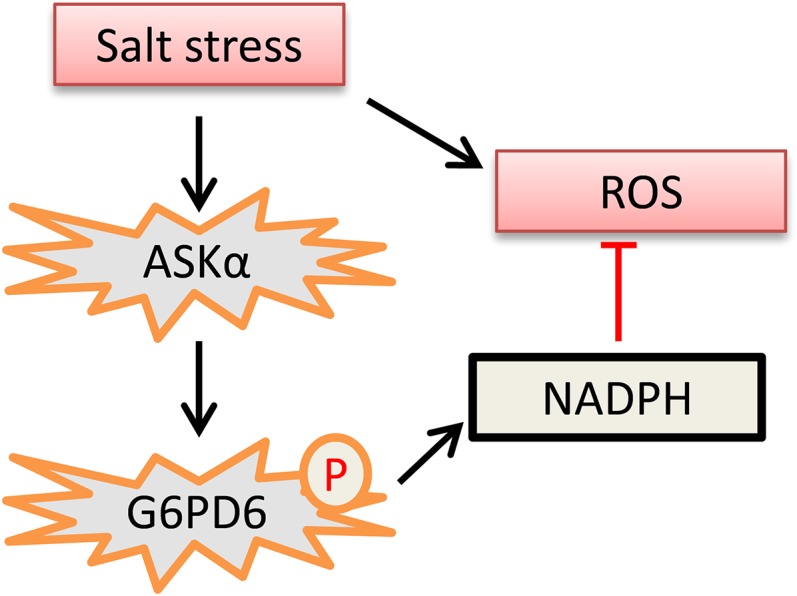Homologs of glycogen synthase kinase 3 (GSK3), also called Shaggy-like kinases, are ubiquitous among eukaryotes, with functions ranging from regulation of the cytoskeleton to signaling in developmental pathways. In plants, GSK3 proteins have been implicated in hormone signaling and in responses to abiotic and biotic stresses (reviewed in Saidi et al., 2012). However, there have been conflicting results about the roles of plant GSK3 proteins in stress responses. Here, Dal Santo et al. (pages 3380–3392) combine molecular genetic and biochemical approaches to clarify the role of an Arabidopsis thaliana GSK3 (called ASKα) in salt/oxidative stress tolerance.
Dal Santo and coworkers established that askα mutants were hypersensitive to salt at both seedling and adult stages, whereas ASKα-overexpressing lines were less sensitive than the wild type. They then measured in vivo ASKα activity via an immunokinase assay in which they used an antibody to pull down a tagged version of ASKα and measured the kinase activity of the immunoprecipitate. In both wild-type and ASKα-overexpressing lines, ASKα activity was higher under high-salt conditions, although the protein levels did not change. The increased ASKα activity was rapidly induced and sustained throughout salt treatment. Together, these data suggest that ASKα is a key component of the salt stress response and that its activity is posttranslationally regulated.
Dal Santo et al. then used a high-throughput metabolic screen to identify possible downstream targets of ASKα, finding that Glc-6-phosphate dehydrogenase (G6PD) activity was reduced in the askα mutant plants under salt stress compared with the wild type. This led the authors to discover that G6PD activity was induced by prolonged salt stress in the wild type and to an even higher level in the ASKα-overexpressing lines. G6PD activity produces NADPH, which serves as the main form of reducing power used for detoxification of reactive oxygen species (ROS). ROS can be generated in response to abiotic stress including salt stress (reviewed in Mittler, 2002). The authors therefore examined the levels of the ROS hydrogen peroxide under salt stress and found that they were higher in the askα mutant and lower in ASKα-overexpressing lines compared with the wild type.
The authors explored the mechanism of ASKα’s effect on G6PD, finding that G6PD protein levels did not change, but that ASKα could phosphorylate two cytosolic G6PDs, namely, G6PD6 and G6PD5. Phosphorylation by ASKα of a conserved Thr-467 residue led to G6PD6 activation, possibly due to the proximity of that residue to the NADP binding site. The significance of these findings was confirmed in vivo: A g6pd mutant was hypersensitive to salt and had altered levels of redox-related compounds in response to salt, similar to the askα mutant. In addition, a constitutively active version of G6PD that mimics phosphorylation at Thr-467 could rescue the salt hypersensitivity of the askα mutant.
Overall, this work nicely elucidates a function for the ASKα GSK3 protein in stress responses (see figure) and identifies G6PD as one of its targets. Given the confusion surrounding plant GSK3 proteins in stress responses, this work provides an important step toward understanding the function of these evolutionarily ancient kinases in plants.

Model for ASKα function in salt stress. Salt stress activates ASKα and induces ROS. ASKα phosphorylates G6PD6, increasing its production of NADPH, which is used to detoxify ROS. (Adapted from Figure 7 from Dal Santo et al. [2012].)
References
- Dal Santo S., Stampfl H., Krasensky J., Kempa S., Gibon Y., Elena Petutschnig E., Rozhon W., Heuck A., Clausen T., Jonak C. (2012). Stress-induced glycogen synthase kinase 3 regulates the redox stress response by phosphorylating glucose-6-phosphate dehydrogenase in Arabidopsis. Plant Cell 24: 3380–3392 [DOI] [PMC free article] [PubMed] [Google Scholar]
- Mittler R. (2002). Oxidative stress, antioxidants and stress tolerance. Trends Plant Sci. 7: 405–410 [DOI] [PubMed] [Google Scholar]
- Saidi Y., Hearn T.J., Coates J.C. (2012). Function and evolution of ‘green’ GSK3/Shaggy-like kinases. Trends Plant Sci. 17: 39–46 [DOI] [PubMed] [Google Scholar]


